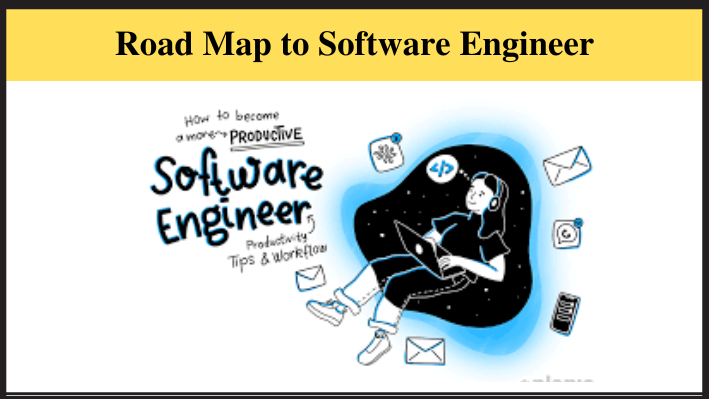Road map to Software Engineer
Road map to Software Engineer
Hello everyone, In this blog we will discuss about software engineer road map or how to become a software engineer. I will promise you, After reading this you will get an idea about software job and software engineer
Road map to become a software engineer / Road map to Software Engineer
Here’s a general road map for becoming a software engineer:
Acquire a solid foundation in computer science: study algorithms, data structures, and programming concepts.
Choose a programming language to learn and become proficient in it.
Build projects: Participate in coding challenges, contribute to open-source projects, and build your own personal projects.
Gain practical experience: Join an internship or take a part-time job in the software development field.
Keep learning: Stay up to date with the latest technologies, attend tech conferences and workshops, and pursue continuing education.
Network with other software engineers: Attend meetups, join online forums, and connect with others in the field to learn from their experiences.
Improve your soft skills: Focus on developing strong communication, collaboration, and problem-solving skills.
Specialize in a specific area of software engineering, such as web development, mobile development, or data science.
Remember, becoming a software engineer is a continuous learning journey. Keep practicing and learning new technologies, and never stop building projects.

Primary requirement to become a software engineer
Here are the primary requirements to become a software engineer:
Education: A bachelor’s degree in computer science or a related field is a common requirement for software engineering positions, although some companies may consider candidates with a strong portfolio of projects and relevant work experience.
Technical skills: Proficiency in at least one programming language, with a good understanding of algorithms, data structures, and software design patterns. Familiarity with various tools and technologies used in software development is also important.
Problem-solving skills: The ability to analyze problems, break them down into smaller components, and find solutions is a critical aspect of software engineering.
Communication skills: The ability to effectively communicate with team members, stakeholders, and customers is important for success in software engineering.
Continuous learning: The technology industry is constantly evolving, and software engineers must be willing to continuously learn and adapt to new technologies and approaches.
Passion for technology: A genuine interest and passion for technology and software development is crucial for a successful career as a software engineer.
Best online resources to start learn software engineering and software development
Here are some of the best online resources to start learning software engineering and software development:
Coursera: Offers online courses in computer science and software engineering from top universities, such as Stanford, MIT, and University of Toronto.
Udemy: Provides a vast selection of online courses in software engineering and development, covering a wide range of technologies and programming languages.
Codecademy: Offers interactive coding lessons and projects in various programming languages.
FreeCodeCamp: A non-profit organization that provides a comprehensive curriculum for learning web development for free.
YouTube: A wealth of tutorials and educational videos on software development and engineering from experienced developers and instructors.
GitHub: A platform for hosting and collaborating on open-source software projects. It’s a great place to find projects to contribute to and learn from other developers.
Stack Overflow: A Q&A site for software developers, where you can ask and answer questions on various software development topics.
HackerRank: A platform that offers coding challenges and competitions to improve your programming skills.
Books: Reading books on software development and engineering can provide a deeper understanding of the subject and serve as a valuable resource for continued learning.
Remember, these resources are just a starting point. The best way to learn software engineering is by actually building projects and learning from experience.

Skills to become a software engineer or software developer
Here are the key skills required to become a software engineer or software developer:
Programming languages: Proficiency in at least one programming language is essential for software engineering. Some of the most common programming languages for software development include Java, Python, C++, and JavaScript.
Algorithms and data structures: A good understanding of algorithms and data structures is crucial for designing and implementing efficient software.
Software design: The ability to design and implement software systems using sound software architecture principles and design patterns.
Debugging and troubleshooting: The ability to identify and resolve issues with software systems is critical for success as a software engineer.
Databases: Knowledge of database management systems and SQL is important for developing software that stores and retrieves data.
Web development: Familiarity with web development technologies, such as HTML, CSS, and JavaScript, is important for developing web applications.
Source control: Experience with version control systems, such as Git, is crucial for managing code and collaborating with other developers.
Agile methodologies: Familiarity with Agile software development methodologies, such as Scrum, is important for delivering software projects effectively and efficiently.
Communication and collaboration: Strong communication and collaboration skills are critical for working with other developers, stakeholders, and customers.
Continuous learning: The technology industry is constantly evolving, and software engineers must be willing and able to continuously learn and adapt to new technologies and approaches
Conclusion: I hope this blog, Road map to Software Engineer gives you an idea about software jobs and software engineer, Keep in touch with us for more interesting stuff.




